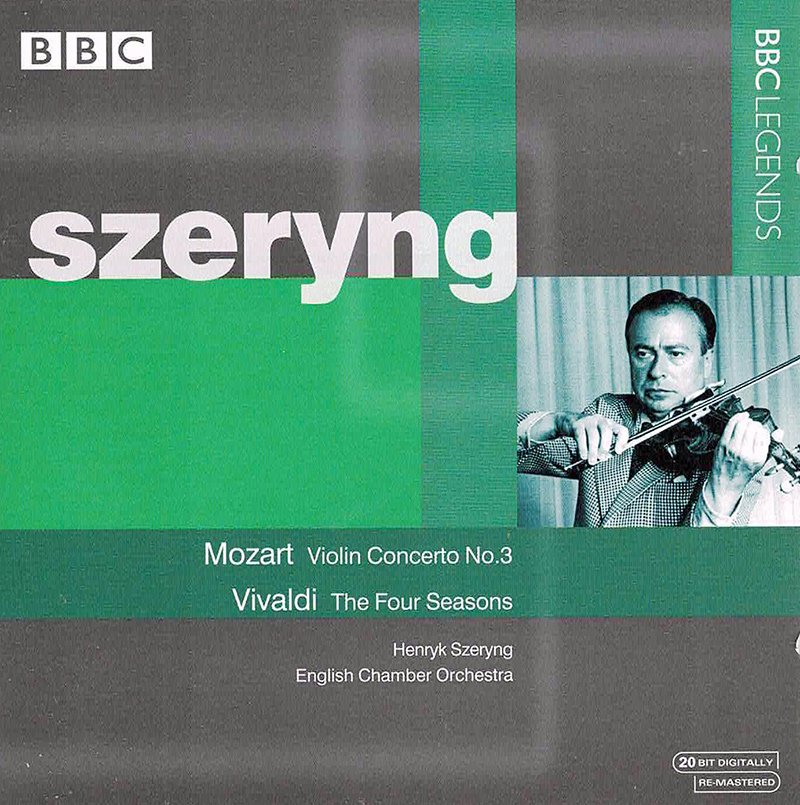Logowanie
Dziś nikt już tak genialnie nie jazzuje!
Bobby Hutcherson, Joe Sample
San Francisco
SHM-CD/SACD - NOWY FORMAT - DŻWIĘK TAK CZYSTY, JAK Z CZASU WIELKIEGO WYBUCHU!
Wayne Shorter, Freddie Hubbard, Herbie Hancock, Ron Carter, Elvin Jones
Speak no evil
UHQCD - dotknij Oryginału - MQA (Master Quality Authenticated)
Chesky! Niezmiennie perfekcyjny
Winylowy niezbędnik
ClearAudio
Double Matrix Professional - Sonic
najbardziej inteligentna i skuteczna pralka do płyt winylowych wszelkiego typu - całkowicie automatyczna
MOZART, VIVALDI, English Chamber Orchestra, Henryk Szeryng
Violin Concerto No. 3 in G major, K216 / The Four Seasons / Concerto for Two Violins and Orchestra in A minor RV522
- English Chamber Orchestra - orchestra
- Henryk Szeryng - violin
- MOZART
- VIVALDI
Lebendige Vergangenheit
Here we can enjoy Szeryng in a 1972 Queen Elizabeth Hall concert with the English Chamber Orchestra, which he also directs. The fare is not new to the discography. He recorded both the Four Seasons, and rather more durably the G major; his set of the complete concertos is still a most impressive achievement. Nevertheless it’s still salutary to be reminded of his prowess in the early seventies at the helm of an assured and compliant band. His Mozartian playing is generally as fresh and persuasive as one remembers it to have been. The legato freedoms are certainly romanticist in orientation but they lavish great depth, especially in the lower strings. Then too there’s the great naturalness of Szeryng’s phrasing, one of his greatest gifts as an elite Mozart player. This makes the rather strange slithery chromaticism at around 5:12 in the first movement all the more perplexing. But there’s nothing to cavil at in the slow movement – it’s simply beautiful playing with a broad gamut of colours to articulate the melodic line. His finale is a solid Rondo, engagingly done. Some may find it just a little staid and lacking in zest – but, Perlman’s quips about him to the contrary, I seldom find Szeryng lacking in personality. And certainly not here. The Four Seasons is perhaps less satisfactory as a reading. It’s quite slow, romantic in orientation once more, with plenty of legato phrasing and ritardandi and the like. The ECO’s string tone is purposeful, powerful but tends somewhat toward the generic-baroque. It tends to be a little unrelieved. It’s true that the slow movement of Autumn is projected with genuine depth of expression and is markedly expressive and that the opening of Winter is eloquently delineated. But against that it should be admitted that for all the noble restraint of Winter’s slow movement things like Autumn’s Allegro finale sound very jog-trotty. There are no decorations or embellishments, which is hardly reprehensible given the time and the player. But perhaps more problematic is the avoidance of colour and a sense of animated fantasy in the performance. For all the moments of finesse this is a rather clement Four Seasons. After Szeryng’s announcement he’s joined by José Luis Garcia for the Allegro from the Concerto for Two Violins and Orchestra in A minor RV522 – very adroitly dispatched. The sound quality is first class and Tully Potter’s notes are predictably intelligent, though I think he and I may differ on the subject of Szeryng’s “spontaneous touches” in the Mozart!


































